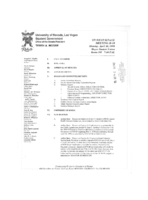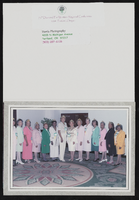Search the Special Collections and Archives Portal
Search Results
Fercos Family Publicity Collection
Identifier
Abstract
The Fercos Family Publicity Collection (approximately 1978-1989) contains newspaper articles, advertisements, and a poster promoting the Flying Fercos, a family of juggling and acrobatic performers who performed in Las Vegas, Nevada at the Dunes Hotel during the 1970s and 1980s. The materials document the Fercos family's act as part of producer Frederic Apcar's shows such as
Archival Collection
Jack Anderson Professional Papers on Operation Life
Identifier
Abstract
Materials in this collection (1969-1989) document various endeavors of the Operation Life organization. They include original correspondence, meeting minutes, news clippings, medical programs, grant applications, legal and financial documents, brochures and pamphlets, and other materials that provide context on the kinds of services provided by Operation Life. These files were kept by Jack Anderson in the course of his work as attorney for Operation Life.
Archival Collection
Katherine L. Rankin oral history interview
Identifier
Abstract
Oral history interview with Katherine L. Rankin conducted by Claytee D. White on June 16, 2014 for the Boyer Early Las Vegas Oral History Project. In the interview, Rankin discusses her childhood, her move to Las Vegas, Nevada, and her career as a librarian. Rankin talks about how she began her library career on the Gila River Reservation in Arizona before accepting a position as an audio and visual materials cataloger at University of Nevada, Las Vegas (UNLV) in the 1970s. Rankin later describes her work with the American Library Association, getting tenure at UNLV, and her role as a map cataloger in UNLV Special Collections and Archives.
Archival Collection

Meeting minutes for Consolidated Student Senate University of Nevada, Las Vegas, April 20, 1998
Date
Archival Collection
Description
Text

Meeting minutes for Consolidated Student Senate University of Nevada, Las Vegas, September 18, 1995
Date
Archival Collection
Description
Text

Transcript of interview with Sandra Peña by Lada Mead and Stefani Evans, March 27, 2017
Date
Archival Collection
Description
Sandra Peña’s story begins in East Los Angeles, where she spent her first fifteen years with her parents (both from Michoacán, Mexico), and her younger sister. The father's managerial position at Master Products allowed the family to live rent-free in a company-owned house behind the main factory, because he collected the rents for the company's two other dwellings. In this interview, Peña recalls the family move to Porterville, in California's Central Valley, her return to Los Angeles at nineteen, and her work with Parson’s Dillingham, a contractor for the Metrolink rail system. She draws the link between the Los Angeles and Las Vegas construction communities by describing her husband's move to Las Vegas to find work; a chance Las Vegas encounter with a friend from Chino, California; her ability to gain employment in Las Vegas at Parson’s, a company that had joint ventured with Parson’s Dillingham, and her move from there to Richardson Construction, a local minority-owned company. As Peña says, "It's kind of all intermingled. Even if you go here and you go there, it's like everybody knows everybody." Throughout, Peña weaves her family story into the narrative as she describes her youth, the birth of her son, the illness and death of her father, and her family's participation in her current employment with Richardson. As she remembers the people, places, and events of her life, Peña speaks to the ways one woman of color built on her interstate construction connections and rose in a male-dominated industry.
Text

Transcript of interview with Joy Snyder by Lisa Gioia-Acres, December 17, 2009
Date
Archival Collection
Description
Joy Snyder, born and raised in Pennsylvania, is the daughter of Jean Dasinto and stepdaughter of Ray Hunt. Though she was raised thinking she was an only child, she shares that as an adult, she was contacted by an aunt who gave her information about an Austrian half-sister. The half-sister had tracked the family through WWII records on her biological father! Joy was raised in a very large extended Italian family (her maternal grandmother was first-generation Italian) and became the first in her family to attend college. She had decided early on that she wanted to be a nurse and chose to attend Temple University Hospital in Philadelphia. She recounts memories of her earliest work there, which began the first week of school. After graduation from nursing school, Joy married her childhood sweetheart, William (Bill) Snyder. They made the move to Las Vegas in 1978 and Joy found work right away at Desert Springs Hospital. She worked there about six months and then took maternity leave after the birth of their second son. When she returned to work, it was at Sunrise Hospital (early 1979) in the newborn nursery. Joy comments on many aspects of her career, including the informal approach to health care, the effects of desert climate on mothers and newborns, and the changes she has seen at Sunrise Hospital. She also comments on adoption practices in Las Vegas, drug-addicted babies, and cultural attitudes that appear during the birthing process. Today Joy is retired and her husband Bill is close to retiring. They feel a strong connection to Las Vegas (Bill has a school named after him), but maintain a second home in New York for their trips back East to visit friends and family. They also keep up with various community activities, including book clubs and running clubs for the children at William Snyder Elementary School.
Text

Alpha Kappa Alpha Sorority 75th Far Western Region conference materials
Date
Archival Collection
Description
From the Alpha Kappa Alpha Sorority, Incorporated, Theta Theta Omega Chapter Records (MS-01014) -- Chapter records file.
Text
International Association of Gaming Attorneys Collection
Identifier
Abstract
The International Association of Gaming Attorneys (IAGA) collection is comprised of materials collected from various corporations and casinos in Nevada and New Jersey, ranging from 1977 to 1986. There are a wide array of documents including: gaming license applications from corporations in Nevada and New Jersey, copies of casino control acts from New Jersey, gaming publications, gaming-conference proceedings, gaming commission reports, newsletters and correspondence of the National Association of Gaming Attorneys (NAGA).
Archival Collection
Irma McGonagill Photograph Collection
Identifier
Abstract
The Irma McGonagill Photograph Collection (1870-1925) consists of thirty black-and-white photographic prints, ten postcards, and fourteen photographic negatives showing Irma McGonagill and her family in Tonopah, Nevada during the mining boom. The images depict the town of Tonopah, mines around the Tonopah area, homes in Tonopah, and the McGonagill family.
Archival Collection
